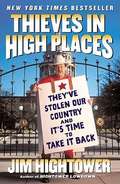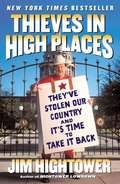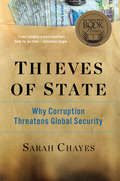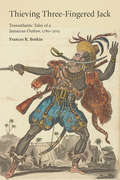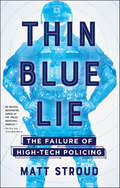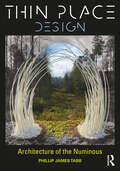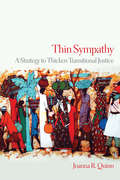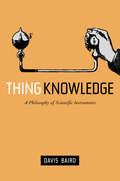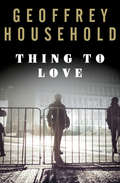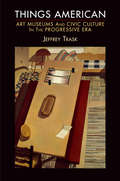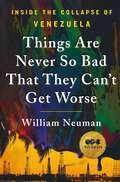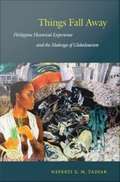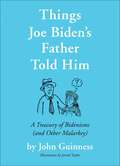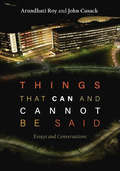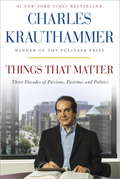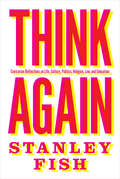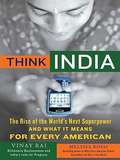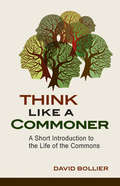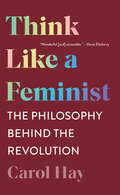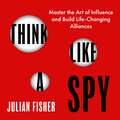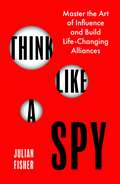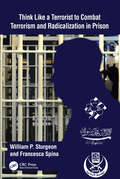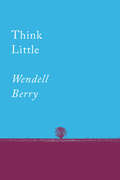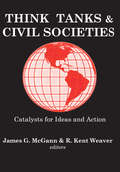- Table View
- List View
Thieves in High Places
by Jim HightowerIn Thieves in High Places, Jim Hightower takes on the Kleptocrats, Wobblycrats, and Bushites with hilarious results. Digging up behind-the-scenes dirt on stories the corporate news media overlooks (and don't get him started on them!), Hightower reveals the real stories behind BushCo's "Friday Night Massacres," what's happened to our food, and the Bush plan for empire. With grassroots solutions, drawing on Hightower's national Rolling Thunder Down- Home Democracy Tour--a traveling festival of rebellion against every tentacle of the corporate-politico power grab--Hightower is tapping into the activist network that is thriving at kitchen tables all over America. This is the real America the rest of the world doesn't get to see, delivered with Hightower's own hilarious brand of wit and outrage.
Thieves in High Places: They've Stolen Our Country and Its Time to Take It Back
by Jim HightowerIn Thieves in High Places, Jim Hightower takes on the Kleptocrats, Wobblycrats, and Bushites with hilarious results. Digging up behind-the-scenes dirt on stories the corporate news media overlooks (and don’t get him started on them!), Hightower reveals the real stories behind BushCo’s "Friday Night Massacres," what’s happened to our food, and the Bush plan for empire. With grassroots solutions, drawing on Hightower’s national Rolling Thunder Down- Home Democracy Tour—a traveling festival of rebellion against every tentacle of the corporate-politico power grab—Hightower is tapping into the activist network that is thriving at kitchen tables all over America. This is the real America the rest of the world doesn’t get to see, delivered with Hightower’s own hilarious brand of wit and outrage.
Thieves of State: Why Corruption Threatens Global Security
by Sarah ChayesA former adviser to the Joint Chiefs of Staff explains how government's oldest problem is its greatest destabilizing force. The world is blowing up. Every day a new blaze seems to ignite: the bloody implosion of Iraq and Syria; the East-West standoff in Ukraine; abducted schoolgirls in northern Nigeria. Is there some thread tying these frightening international security crises together? In a riveting account that weaves history with fast-moving reportage and insider accounts from the Afghanistan war, Sarah Chayes identifies the unexpected link: corruption. Since the late 1990s, corruption has reached such an extent that some governments resemble glorified criminal gangs, bent solely on their own enrichment. These kleptocrats drive indignant populations to extremes--ranging from revolution to militant puritanical religion. Chayes plunges readers into some of the most venal environments on earth and examines what emerges: Afghans returning to the Taliban, Egyptians overthrowing the Mubarak government (but also redesigning Al-Qaeda), and Nigerians embracing both radical evangelical Christianity and the Islamist terror group Boko Haram. In many such places, rigid moral codes are put forth as an antidote to the collapse of public integrity. The pattern, moreover, pervades history. Through deep archival research, Chayes reveals that canonical political thinkers such as John Locke and Machiavelli, as well as the great medieval Islamic statesman Nizam al-Mulk, all named corruption as a threat to the realm. In a thrilling argument connecting the Protestant Reformation to the Arab Spring, Thieves of State presents a powerful new way to understand global extremism. And it makes a compelling case that we must confront corruption, for it is a cause--not a result--of global instability.
Thieving Three-Fingered Jack: Transatlantic Tales of a Jamaican Outlaw, 1780-2015
by Frances R. BotkinThe fugitive slave known as “Three-Fingered Jack” terrorized colonial Jamaica from 1780 until vanquished by Maroons, self-emancipated Afro-Jamaicans bound by treaty to police the island for runaways and rebels. A thief and a killer, Jack was also a freedom fighter who sabotaged the colonial machine until his grisly death at its behest. Narratives about his exploits shed light on the problems of black rebellion and solutions administered by the colonial state, creating an occasion to consider counter-narratives about its methods of divide and conquer. For more than two centuries, writers, performers, and storytellers in England, Jamaica, and the United States have “thieved" Three Fingered Jack's riveting tale, defining black agency through and against representations of his resistance.Frances R. Botkin offers a literary and cultural history that explores the persistence of stories about this black rebel, his contributions to constructions of black masculinity in the Atlantic world, and his legacies in Jamaican and United States popular culture.
Thin Blue Lie: The Failure of High-Tech Policing
by Matt StroudA wide-ranging investigation of how supposedly transformative technologies adopted by law enforcement have actually made policing worse—lazier, more reckless, and more discriminatoryAmerican law enforcement is a system in crisis. After explosive protests responding to police brutality and discrimination in Baltimore, Ferguson, and a long list of other cities, the vexing question of how to reform the police and curb misconduct stokes tempers and fears on both the right and left. In the midst of this fierce debate, however, most of us have taken for granted that innovative new technologies can only help. During the early 90s, in the wake of the infamous Rodney King beating, police leaders began looking to corporations and new technologies for help. In the decades since, these technologies have—in theory—given police powerful, previously unthinkable faculties: the ability to incapacitate a suspect without firing a bullet (Tasers); the capacity to more efficiently assign officers to high-crime areas using computers (Compstat); and, with body cameras, a means of defending against accusations of misconduct.But in this vivid, deeply-reported book, Matt Stroud shows that these tools are overhyped and, in many cases, ineffective. Instead of wrestling with tough fundamental questions about their work, police leaders have looked to technology as a silver bullet and stood by as corporate interests have insinuated themselves ever deeper into the public institution of law enforcement. With a sweeping history of these changes, Thin Blue Lie is a must-read for anyone seeking to understand how policing became what it is today.
Thin Place Design: Architecture of the Numinous
by Phillip James TabbWhat makes the places we inhabit extraordinary? Why are some urban spaces more vital and restorative? Wonderful landscapes, inspiring works of architecture and urban design, and the numinous experiences that accompany them have been an integral dimension of our culture. Up-lifting spaces, dramatic use of natural light, harmonic proportional geometry, magical landscapes, historic sites and vital city centers create special, even sacred moments in architecture and planning. This quality of experience is often seen as an aesthetic purpose intended to inspire, ennoble, ensoul and spiritually renew. Architecture and urban spaces, functioning in this way, are considered to be thin places.
Thin Sympathy: A Strategy to Thicken Transitional Justice (Pennsylvania Studies in Human Rights)
by Joanna R. QuinnTransitional justice, commonly defined as the process of confronting the legacies of past human rights abuses and atrocities, often does not produce the kinds of results that are imagined. In multiethnic, divided societies like Uganda, people who have not been directly affected by harm, atrocity, and abuse go about their daily lives without ever confronting what happened in the past. When victims and survivors raise their voices to ask for help, or when plans are announced to address that harm, it is this unaffected population that see such plans as pointless. They complain about what they perceive as the "needless" time and money that will be spent to fix something that they see as unimportant and, ultimately, block any restorative processes.Joanna R. Quinn spent twenty years working in Uganda and uses its particular case as a lens through which she examines the failure of deeply divided societies to acknowledge the past. She proposes that the needed remedy is the development of a very rudimentary understanding—what she calls "thin sympathy"—among individuals in each of the different factions and groups of the other's suffering prior to establishing any transitional justice process. Based on 440 extensive interviews with elites and other thought leaders in government, traditional institutions, faith groups, and NGOs, as well as with women and children throughout the country, Thin Sympathy argues that the acquisition of a basic understanding of what has taken place in the past will enable the development of a more durable transitional justice process.
Thing Knowledge: A Philosophy of Scientific Instruments
by Davis BairdWestern philosophers have traditionally concentrated on theory as the means for expressing knowledge about a variety of phenomena. This absorbing book challenges this fundamental notion by showing how objects themselves, specifically scientific instruments, can express knowledge. As he considers numerous intriguing examples, Davis Baird gives us the tools to "read" the material products of science and technology and to understand their place in culture. Making a provocative and original challenge to our conception of knowledge itself, Thing Knowledge demands that we take a new look at theories of science and technology, knowledge, progress, and change. Baird considers a wide range of instruments, including Faraday's first electric motor, eighteenth-century mechanical models of the solar system, the cyclotron, various instruments developed by analytical chemists between 1930 and 1960, spectrometers, and more.
Thing to Love
by Geoffrey HouseholdAs the republic of Guayanas teeters on the brink of civil war, the revolution depends on one man When Miro Kucera arrived in Guayanas, the glorious army of the republic was little more than an expensively costumed joke. Born in Czechoslovakia, Kucera learned to fight under the tutelage of the Free French, and it took him less than a decade to make the Guayanan army the envy of Latin America. As President Vidal modernized the country, Kucera's forces backed him up. But though they pledged allegiance to the president, their loyalty was to Kucera alone. After years in power, Vidal finds that his hold on the country is slipping. An army of reformers is gathering in the shadows, and a coup is coming fast. When the rebellion begins, Kucera's army will be the deciding factor. But after years preparing for war, will this leader be ready to fight a revolution?
Things American: Art Museums and Civic Culture in the Progressive Era (The Arts and Intellectual Life in Modern America)
by Jeffrey TraskAmerican art museums of the Gilded Age were established as civic institutions intended to provide civilizing influences to an urban public, but the parochial worldview of their founders limited their democratic potential. Instead, critics have derided nineteenth-century museums as temples of spiritual uplift far removed from the daily experiences and concerns of common people. But in the early twentieth century, a new generation of cultural leaders revolutionized ideas about art institutions by insisting that their collections and galleries serve the general public.Things American: Art Museums and Civic Culture in the Progressive Era tells the story of the civic reformers and arts professionals who brought museums from the realm of exclusivity into the progressive fold of libraries, schools, and settlement houses. Jeffrey Trask's history focuses on New York's Metropolitan Museum of Art, which stood at the center of this movement to preserve artifacts from the American past for social change and Americanization. Metropolitan trustee Robert de Forest and pioneering museum professional Henry Watson Kent influenced a wide network of fellow reformers and cultural institutions. Drawing on the teachings of John Dewey and close study of museum developments in Germany and Great Britain, they expanded audiences, changed access policies, and broadened the scope of what museums collect and display. They believed that tasteful urban and domestic environments contributed to good citizenship and recognized the economic advantages of improving American industrial production through design education. Trask follows the influence of these people and ideas through the 1920s and 1930s as the Met opened its innovative American Wing while simultaneously promoting modern industrial art.Things American is not only the first critical history of the Metropolitan Museum. The book also places museums in the context of the cultural politics of the progressive movement—illustrating the limits of progressive ideas of democratic reform as well as the boldness of vision about cultural capital promoted by museums and other cultural institutions.
Things Are Never So Bad That They Can't Get Worse: Inside the Collapse of Venezuela
by William NeumanRichly reported...a thorough and important history." -Tim Padgett, The New York Times A nuanced and deeply-reported account of the collapse of Venezuela, and what it could mean for the rest of the world.Today, Venezuela is a country of perpetual crisis—a country of rolling blackouts, nearly worthless currency, uncertain supply of water and food, and extreme poverty. In the same land where oil—the largest reserve in the world—sits so close to the surface that it bubbles from the ground, where gold and other mineral resources are abundant, and where the government spends billions of dollars on public works projects that go abandoned, the supermarket shelves are bare and the hospitals have no medicine. Twenty percent of the population has fled, creating the largest refugee exodus in the world, rivaling only war-torn Syria’s crisis. Venezuela’s collapse affects all of Latin America, as well as the United States and the international community.Republicans like to point to Venezuela as the perfect example of the emptiness of socialism, but it is a better model for something else: the destructive potential of charismatic populist leadership. The ascent of Hugo Chávez was a precursor to the emergence of strongmen that can now be seen all over the world, and the success of the corrupt economy he presided over only lasted while oil sold for more than $100 a barrel. Chávez’s regime and policies, which have been reinforced under Nicolás Maduro, squandered abundant resources and ultimately bankrupted the country.Things Are Never So Bad That They Can’t Get Worse is a fluid combination of journalism, memoir, and history that chronicles Venezuela’s tragic journey from petro-riches to poverty. Author William Neuman witnessed it all firsthand while living in Caracas and serving as the New York Times Andes Region Bureau Chief. His book paints a clear-eyed, riveting, and highly personal portrait of the crisis unfolding in real time, with all of its tropical surrealism, extremes of wealth and suffering, and gripping drama. It is also a heartfelt reflection of the country’s great beauty and vibrancy—and the energy, passion, and humor of its people, even under the most challenging circumstances.
Things Fall Away: Philippine Historical Experience and the Makings of Globalization
by Neferti X. M. TadiarIn Things Fall Away, Neferti X. M. Tadiar offers a new paradigm for understanding politics and globalization. Her analysis illuminates both the power of Filipino subaltern experience to shape social and economic realities and the critical role of the nation's writers and poets in that process. Through close readings of poems, short stories, and novels brought into conversation with scholarship in anthropology, sociology, politics, and economics, Tadiar demonstrates how the devalued experiences of the Philippines' vast subaltern populations--experiences that "fall away" from the attention of mainstream and progressive accounts of the global capitalist present--help to create the material conditions of social life that feminists, urban activists, and revolutionaries seek to transform. Reading these "fallout" experiences as vital yet overlooked forms of political agency, Tadiar offers a new and provocative analysis of the unrecognized productive forces at work in global trends such as the growth of migrant domestic labor, the emergence of postcolonial "civil society," and the "democratization" of formerly authoritarian nations. Tadiar treats the historical experiences articulated in feminist, urban protest, and revolutionary literatures of the 1960s-90s as "cultural software" for the transformation of dominant social relations. She considers feminist literature in relation to the feminization of labor in the 1970s, when between 300,000 and 500,000 prostitutes were working in the areas around U. S. military bases, and in the 1980s and 1990s, when more than five million Filipinas left the country to toil as maids, nannies, nurses, and sex workers. She reads urban protest literature in relation to authoritarian modernization and crony capitalism, and she reevaluates revolutionary literature's constructions of the heroic revolutionary subject and the messianic masses, probing these social movements' unexhausted cultural resources for radical change.
Things Joe Biden's Father Told Him: A Treasury of Bidenisms (and Other Malarkey)
by John GuinnessAs President Biden so often tells us: &“My dad had a saying…&” Prudent life lessons—and some downright weird advice—from one Biden to another.Joseph R. Biden Sr. never held political office, but that didn&’t stop him from imparting a lifetime&’s worth of guidance to his son and our 46th president.Featuring such classic Bidenisms as &“I may be Irish, but I&’m not stupid,&” &“Don&’t compare me to the Almighty, compare me to the alternative,&” and the ever-famous &“That&’s a bunch of malarkey,&” THINGS JOE BIDEN&’S FATHER TOLD HIM is a curious catechism of Biden family wisdom.
Things That Can and Cannot Be Said: Essays and Conversations
by Arundhati Roy John CusackEssays and Conversations
Things That Matter: Three Decades of Passions, Pastimes and Politics
by Charles KrauthammerFrom America's preeminent columnist, named by the Financial Times the most influential commentator in the nation, the long-awaited collection of Charles Krauthammer's essential, timeless writings. A brilliant stylist known for an uncompromising honesty that challenges conventional wisdom at every turn, Krauthammer has for decades dazzled readers with his keen insight into politics and government. His weekly column is a must-read in Washington and across the country. Now, finally, the best of Krauthammer's intelligence, erudition and wit are collected in one volume. Readers will find here not only the country's leading conservative thinker offering a passionate defense of limited government, but also a highly independent mind whose views--on feminism, evolution and the death penalty, for example--defy ideological convention. Things That Matter also features several of Krauthammer's major path-breaking essays--on bioethics, on Jewish destiny and on America's role as the world's superpower--that have profoundly influenced the nation's thoughts and policies. And finally, the collection presents a trove of always penetrating, often bemused reflections on everything from border collies to Halley's Comet, from Woody Allen to Winston Churchill, from the punishing pleasures of speed chess to the elegance of the perfectly thrown outfield assist. With a special, highly autobiographical introduction in which Krauthammer reflects on the events that shaped his career and political philosophy, this indispensible chronicle takes the reader on a fascinating journey through the fashions and follies, the tragedies and triumphs, of the last three decades of American life.
Think Again
by Stanley FishFrom 1995 to 2013, Stanley Fish's provocative New York Times columns consistently generated passionate discussion and debate. In Think Again, he has assembled almost one hundred of his best columns into a thematically arranged collection with a substantial new introduction that explains his intention in writing these pieces and offers an analysis of why they provoked so much reaction.Some readers reported being frustrated when they couldn't figure out where Fish, one of America's most influential thinkers, stood on the controversies he addressed in the essays--from atheism and affirmative action to plagiarism and postmodernism. But, as Fish says, that is the point. Opinions are cheap; you can get them anywhere. Instead of offering just another set of them, Fish analyzes and dissects the arguments put forth by different sides--in debates over free speech, identity politics, the gun lobby, and other hot-button topics--in order to explain how their arguments work or don't work. In short, these are essays that teach you not what to think but how to think more clearly.Brief and accessible yet challenging, these essays provide all the hard-edged intellectual, cultural, and political analysis one expects from Fish. At the same time, the collection includes a number of revealing and even poignant autobiographical essays in which, as Fish says, "readers will learn about my anxieties, my aspirations, my eccentricities, my foibles, my father, and my obsessions--Frank Sinatra, Ted Williams, basketball, and Jews." Reflecting the wide-ranging interests of one of today's leading critics, this is Fish's broadest and most engaging book to date.
Think India
by William L. Simon Vinay RaiWith 1. 1 billion residents, the world's largest democracy is poised to dominate the world stage. Vinay Rai, one of India's wealthiest men, gives an insider's view into his country's dynamic transformation, revealing the forces and unique characteristics behind India's meteoric rise.
Think Like a Commoner
by David BollierThe biggest "tragedy of the commons" is the misconception that commons are failures--relics from another era rendered unnecessary by the market and state. Think Like a Commoner dispels such prejudices by explaining the rich history and promising future of the commons--an ageless paradigm of cooperation and fairness that is re-making our world.With graceful prose and dozens of fascinating stories, David Bollier describes the quiet revolution that is pioneering practical forms of self-governance and production controlled by people themselves. Think Like a Commoner explains how the commons: Is an exploding field of DIY innovation ranging from Wikipedia and seed-sharing to community forests, collaborative consumption, and beyond Challenges the standard narrative of market economics by explaining how cooperation generates significant value and human fulfillment Provides a framework of law and social action that can help us move beyond the pathologies of neoliberal capitalismWe have a choice: ignore the commons and suffer the ongoing private plunder of our common wealth, or Think Like a Commoner and learn how to rebuild our society and reclaim our shared inheritance. This accessible, comprehensive introduction to the commons will surprise and enlighten you, and provoke you to action.David Bollier is an author, activist, blogger, and independent scholar. He is the author of six books on different aspects of the commons, including Green Governance, The Wealth of the Commons, and Viral Spiral, and is a frequent speaker at conferences, colleges and universities, and policy workshops.
Think Like a Feminist: The Philosophy Behind The Revolution
by Carol HayAn audacious and accessible guide to feminist philosophy—its origins, its key ideas, and its latest directions. Think Like a Feminist is an irreverent yet rigorous primer that unpacks over two hundred years of feminist thought. In a time when the word feminism triggers all sorts of responses, many of them conflicting and misinformed, Professor Carol Hay provides this balanced, clarifying, and inspiring examination of what it truly means to be a feminist today. She takes the reader from conceptual questions of sex, gender, intersectionality, and oppression to the practicalities of talking to children, navigating consent, and fighting for adequate space on public transit, without deviating from her clear, accessible, conversational tone. Think Like a Feminist is equally a feminist starter kit and an advanced refresher course, connecting longstanding controversies to today’s headlines. Think Like a Feminist takes on many of the essential questions that feminism has risen up to answer: Is it nature or nurture that’s responsible for our gender roles and identities? How is sexism connected to racism, classism, homophobia, transphobia, and other forms of oppression? Who counts as a woman, and who gets to decide? Why have men gotten away with rape and other forms of sexual violence for so long? What responsibility do women themselves bear for maintaining sexism? What, if anything, can we do to make society respond to women’s needs and desires? Ferocious, insightful, practical, and unapologetically opinionated, Think Like a Feminist is the perfect book for anyone who wants to understand the continuing effects of misogyny in society. By exploring the philosophy underlying the feminist movement, Carol Hay brings today’s feminism into focus, so we can deliberately shape the feminist future.
Think Like a Spy: Master the Art of Influence and Build Life-Changing Alliances
by Julian Fisher'It's rare to find a book that is not only intensely personal but deeply practical. Julian Fisher has somehow pulled it off, in this fascinating and engaging guide to the art of influence. Think Like a Spy is a fantastic read, full of eye-opening espionage tradecraft as well as insightful tips on how to achieve your business goals. Highly recommended' - Henry Hemming, author of Four Shots in the NightDiscover the secret skills of influence and persuasion taught to intelligence officers and how to adapt them to win over personal and professional allies to your cause. Every day, intelligence officers achieve the unimaginable. They persuade people to share classified secrets with them. To become traitors, in fact. And their targets do it willingly, despite the risk of imprisonment, torture and, even, execution. Spies achieve this thanks to their structured use of nine secret skills of espionage. In Think Like a Spy, you'll learn these techniques and how to adapt them for effective and ethical use in your own life.A good spy is a people-person. She knows how to identify a potential agent, how to attract their attention and what to do to build an enduring relationship with them. From this base, she will coax out personal information to work out what makes her target tick. She will use that knowledge and her understanding of human psychology to her advantage while winning lasting commitment from her new ally.All these skills can be mastered and turned to use in civilian life. The author realised that he used all of them in his own progress from the poorest postcode in Britain to Oxford University, into a blue-blooded stockbroking firm, and on to a thrilling and varied career in the security and intelligence worlds. Julian uses a wide variety of stories from this journey to illustrate how spy skills can be adapted to situations and challenges that we all face.Everyone is capable of thinking like a spy and of using that thinking to transform their lives. This is your opportunity to learn how.
Think Like a Spy: Master the Art of Influence and Build Life-Changing Alliances
by Julian Fisher'It's rare to find a book that is not only intensely personal but deeply practical. Julian Fisher has somehow pulled it off, in this fascinating and engaging guide to the art of influence. Think Like a Spy is a fantastic read, full of eye-opening espionage tradecraft as well as insightful tips on how to achieve your business goals. Highly recommended' - Henry Hemming, author of Four Shots in the NightDiscover the secret skills of influence and persuasion taught to intelligence officers and how to adapt them to win over personal and professional allies to your cause. Every day, intelligence officers achieve the unimaginable. They persuade people to share classified secrets with them. To become traitors, in fact. And their targets do it willingly, despite the risk of imprisonment, torture and, even, execution. Spies achieve this thanks to their structured use of nine secret skills of espionage. In Think Like a Spy, you'll learn these techniques and how to adapt them for effective and ethical use in your own life.A good spy is a people-person. She knows how to identify a potential agent, how to attract their attention and what to do to build an enduring relationship with them. From this base, she will coax out personal information to work out what makes her target tick. She will use that knowledge and her understanding of human psychology to her advantage while winning lasting commitment from her new ally.All these skills can be mastered and turned to use in civilian life. The author realised that he used all of them in his own progress from the poorest postcode in Britain to Oxford University, into a blue-blooded stockbroking firm, and on to a thrilling and varied career in the security and intelligence worlds. Julian uses a wide variety of stories from this journey to illustrate how spy skills can be adapted to situations and challenges that we all face.Everyone is capable of thinking like a spy and of using that thinking to transform their lives. This is your opportunity to learn how.
Think Like a Spy: Master the Art of Influence and Build Life-Changing Alliances
by Julian Fisher'It's rare to find a book that is not only intensely personal but deeply practical. Julian Fisher has somehow pulled it off, in this fascinating and engaging guide to the art of influence. Think Like a Spy is a fantastic read, full of eye-opening espionage tradecraft as well as insightful tips on how to achieve your business goals. Highly recommended' - Henry Hemming, author of Four Shots in the NightDiscover the secret skills of influence and persuasion taught to intelligence officers and how to adapt them to win over personal and professional allies to your cause. Every day, intelligence officers achieve the unimaginable. They persuade people to share classified secrets with them. To become traitors, in fact. And their targets do it willingly, despite the risk of imprisonment, torture and, even, execution. Spies achieve this thanks to their structured use of nine secret skills of espionage. In Think Like a Spy, you'll learn these techniques and how to adapt them for effective and ethical use in your own life.A good spy is a people-person. She knows how to identify a potential agent, how to attract their attention and what to do to build an enduring relationship with them. From this base, she will coax out personal information to work out what makes her target tick. She will use that knowledge and her understanding of human psychology to her advantage while winning lasting commitment from her new ally.All these skills can be mastered and turned to use in civilian life. The author realised that he used all of them in his own progress from the poorest postcode in Britain to Oxford University, into a blue-blooded stockbroking firm, and on to a thrilling and varied career in the security and intelligence worlds. Julian uses a wide variety of stories from this journey to illustrate how spy skills can be adapted to situations and challenges that we all face.Everyone is capable of thinking like a spy and of using that thinking to transform their lives. This is your opportunity to learn how.
Think Like a Terrorist to Combat Terrorism and Radicalization in Prison
by William P. Sturgeon Francesca SpinaThink Like a Terrorist to Combat Terrorism and Radicalization in Prison provides guidelines for hardening facilities, training staff, preparing for radicalized-terrorist inmates’ incarceration, and monitoring these inmates after their release. The book combines practitioner experience with scholarly insights to offer practical suggestions bolstered by research. The authors offer suggestions for housing, programming, security, and staff training with the ultimate goal of keeping correctional facilities, staff, and other inmates, safe from radicalization and spreading terrorist doctrines and terrorist acts, which requires examining and potentially changing prison and correctional officer policies and procedures, hiring and training suitable staff, and ensuring technology is available. Correctional facilities can curtail the recruitment and radicalization of inmates by developing staff training, de-radicalization programs, management methods, techniques, and practices that address the recruitment issues associated with this threat. The need for understanding, and the role line correctional officers and first-line supervisors play in preventing radicalization, is critical in this process. It is also vital to connect with and maintain communication with appropriate security and intelligence agencies as needed. Key Features: • Outlines common terrorist and extremist activities in prison using relevant real-world examples • Instructs on how to detect and recognize such efforts as recruitment and radicalization and how to curtail and prevent such activity • Provides guidance on establishing de-radicalization programs within prison facilities • Presents recommendations on collecting, analyzing, and disseminating intelligence to correctional, law-enforcement, and intelligence agencies on potential terrorist activities and recruitment efforts
Think Little: Essays (Counterpoints #1)
by Wendell BerryFirst published in 1972, “Think Little” is cultural critic and agrarian Wendell Berry at his best: prescient about the dire environmental consequences of our mentality of greed and exploitation, yet hopeful that we will recognize war and oppression and pollution not as separate issues, but aspects of the same. “Think Little” is presented here alongside one of Berry’s most popular and personal essays, “A Native Hill.” This gentle essay of recollection is told alongside a poetic lesson in geography, as Berry explains at length and in detail, that what he stands for is what he stands on.Each palm–size book in the Counterpoints series is meant to stay with you, whether safely in your pocket or long after you turn the last page. From short stories to essays to poems, these little books celebrate our most–beloved writers, whose work encapsulates the spirit of Counterpoint Press: cutting–edge, wide–ranging, and independent.
Think Tanks and Civil Societies: Catalysts for Ideas and Action
by R. Kent Weaver James G. McGannGovernment and individual policymakers throughout the developed and developing world face the common problem of bringing expert knowledge to bear in government decision making. Policymakers need understandable, reliable, accessible, and useful information about the societies they govern. They also need to know how current policies are working, as well as possible alternatives and their likely costs and consequences. This expanding need has fostered the growth of independent public policy research organizations, commonly known as think tanks. Think Tanks and Civil Societies analyzes their growth, scope, and constraints, while providing institutional profiles of such organizations in every region of the world.Beginning with North America, contributors analyze think tank development past and future, consider their relationship to the general political culture, and provide detailed looks at such examples as the Heritage Foundation and the Institute for Research on Public Policy. A historical and subregional overview of think tanks throughout Europe notes the emphasis on European Union issues and points to a dramatic rise in the number and influence of free market institutes across the continent. Think tanks in Germany, Spain, and France are profiled with respect to national politics and cultures. Advanced industrial nations of northern Asia are compared and contrasted, revealing a greater need for independent policy voices. Moving to countries undergoing economic transition, contributors deal with challenges posed in Russia and the former Soviet bloc and their think tanks' search for influence, independence, and sustainability. Other chapters deal with the developing countries of Africa, Asia, the Middle East, and Latin America, finding that the number, quality, and independence of think tanks is largely determined by the degree of democracy in individual nations.
